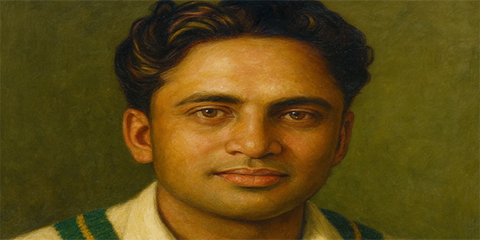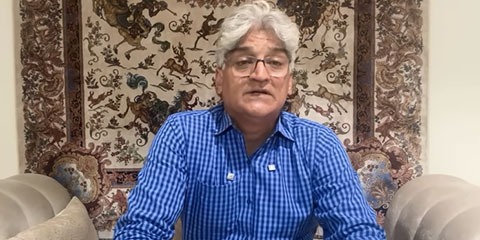Rizwan Ehsan Ali: How a Pakistan cricket journalist rose from page maker to Associated Press
JournalismPakistan.com | Published 3 months ago | Dr. Nauman Niaz (TI)
Join our WhatsApp channel
ISLAMABAD — He did not arrive at sports journalism with the fanfare of a prodigy, nor the confidence of a native tongue. He came instead with a suitcase half-filled with broken English and the other half with resolve.
In the newsrooms, where phrases are sharpened into headlines and adjectives traded like inheritance, he stood at first as an outsider. His sentences stumbled, his syntax faltered, his pauses betrayed him. But he did not flinch. He bent his head to the craft with the conspicuous patience of one who knows the road is long and refuses to take shortcuts.
From Obscurity to Cricket Journalism Excellence
There is a certain envy, charm, and ambition in the unlikely beginnings of journalists who never meant to be. His beginnings were in obscurity, in places where cricket scores were scribbled in margins and stories passed like routine exchanges. He taught himself the cadence of reportage the way a batsman learns to leave the ball outside off stump: by repetition, by mistake, by perseverance.
In the fragile start of his career, English was not yet his ally. But if language is a wall, he treated each word as a brick to be placed, carefully, deliberately, until the wall no longer imprisoned him but became the house he built.
Thirty Years with Associated Press: A Testament to Dedication
Thirty years with the Associated Press. Thirty years without adornment or trumpet. To last that long in an institution that has devoured even the brilliant is not an accident; it is the proof of conscience made habit. His method was not revolutionary but steadfast. He took stories apart as a craftsman would dismantle a clock, noting every cog, polishing every wheel, before reassembling them so that the whole ticked clean and true.
He was not loud in press boxes, not the first to jump on a scandal or the last to desert a failing team. Instead, he became the spine of the work, the one on whom others leaned, the one whose dispatches, reliable as the evening prayer, gave the game its unhurried truth.
The Quiet Contradiction of Sports Journalism
If journalism often attracts the flamboyant, he was its quiet contradiction. He did not seek the panel lights nor the grand signature columns. He worked at the backend, his name seldom in bold, his face unknown to many who read him. Yet in that very invisibility lay his strength. He was loved not because he proclaimed himself indispensable, but because his humility insisted that the work was always larger than the worker.
Editors trusted him, colleagues respected him, and cricketers knew that when he wrote of them, it was without malice or agenda, simply as the record required.
Rizwan Ehsan Ali: A Story of Faith and Perseverance
There is a kind of wealth that cannot be measured in salaries or accolades. His was the wealth of persistence, of shaping a life out of words when the words at first resisted him. From rags to a modest form of riches, his story is not gilded but burnished, its glow born of use and time.
Writing about Rizwan Ehsan Ali, Joji, to us is not so much a recollection as it is a privilege. To summon him onto the page is to summon more than a boy or a man; it is to draw forth a spirit scraped from loss, tempered by faith, and burnished by humour.
Early Life and Character Formation
His story began with absence. A father gone too soon, a mother left to hold the fragments together, a house that learned to survive on resilience. Where such stories often leave wounds that fester, his instead sculpted a clarity of purpose. He grew up on principles when others grew on distractions; honesty became his only strength, morality his daily bread.
He found God early, not in ritual but in revelation, as though faith itself had walked to his side and decided never to leave. That faith, uncontaminated and uncorrupted, was less a sermon and more a direction, pointing him through the tangles of a young life.
St. Mary's Academy Days: Cricket and Character
Thin, wiry, of adequate height but unremarkable at first glance, Rizwan carried himself with an elegance that belied hardship. There was something clean in his manner, something disarming in his smile, and behind it a humour that could ripple through a room. His satire was not cruel but contagious, a wit that lifted rather than cut.
At St. Mary's Academy in Lalazar, where he was a year senior to me, he left impressions that linger. He was not the boy you expected to be serious, and yet he carried himself with dignity that made you take him seriously.
And then there was cricket. On the field, Joji was something else, part competitor, part magician, overwhelmingly unassuming. His action was a puzzle: a smooth run-up leading into a whip of the shoulders that sent the ball skidding, lifting, catching you unawares. He was fast medium, right-arm, not express, but enough to deceive, to make batsmen hurry where they thought they had time.
The News International: Building a Foundation
By the time Rawalpindi Medical College opened its doors to me, I had drifted into writing, first for myself, then for The News International, no longer a freelancer but a sub-editor. And it was there, amid the pages and deadlines, that I found him again. Joji, once of St. Mary's, now older, familiar, yet carrying the same unmistakable essence.
By then, Rizwan had grown into more than a boyhood memory. He was a man who lived his principles. Honesty was no longer a habit but a creed. The process was not a burden, but his method. Where others bent to convenience, he stood straight; where compromise warranted, he refused to listen.
Transformation from Pagemaker to Sports Correspondent
Writing about Rizwan Ehsan Ali, Joji as we knew him, is not writing at all but remembering, and remembering him is remembering light. His story has in it the shape of struggle but none of its darkness, the heft of responsibility without the bend of despair. The only son, still a Master's student when he began shouldering the home, was at once caretaker and companion to his widowed mother.
At The News International, where he began, he was loved instantly and universally. It was not difficult to see why. He was intelligent, computer-literate in a time when such skills were still half-rarity, and he had a mind that was quick to connect dots, quick to find solutions. His execution was sharp, precise, and nearly flawless.
The Mentorship That Changed Everything
But even a heart so deeply set in flow has its longings. For Joji, it was always cricket. It coursed through him not as pastime but as passion, the sort of passion that insists on expression. Yet language was a hurdle. He was no writer in those early days. His English was serviceable but unsuited to the craft of features, less still the nuanced rigour of sub-editing.
But Joji's passion was not to be stilled by form. He longed to cover the game he loved, to move from the mechanics of page-making to the storytelling of sport. And in that longing, he turned to Imran Naeem Ahmad, our editor, asking for the chance to shift.
Imran, generous in his way, obliged. He opened a door where another might have kept it shut, giving Joji the freedom to learn, to fail, to grow. He taught him the basics of reporting, the framework of a story, the logic of a match report.
Evolution of a Cricket Correspondent
Slowly, Joji began accompanying us to matches, domestic and international alike. He would watch, take notes, return to the desk, and submit his drafts to Imran or, on occasion, to me. The writing at first was plain, simple, sometimes grammatically flawed, never embellished. Yet he persisted. He wrote and wrote, and with each report, something sharpened.
Before long, the pagemaker had become a correspondent, and not only an adequate one but a fine one. He had made the transition fully. What had seemed an unlikely shift began to feel inevitable. His evolution did not stop there. Mentored still by Imran, he was soon drawn to the Associated Press as their cricket writer, and there he has remained, continuing with the same resolve that had first carried him from page to press box.
Covering Cricket's Biggest Stages
And what a canvas he has since painted upon. From the Sports Desk of The News International to press boxes across continents, Joji has covered the grandest of stages: two ICC World Cups in Sri Lanka, the Champions Trophy in India, the Asian Games in China, and the Commonwealth Games in New Delhi. He has been a near-constant figure in the United Arab Emirates, recounting Pakistan's long exile of home games.
And perhaps most remarkably, he has covered every single Pakistan home international since 1995, an achievement few can claim, and fewer still can claim with his humility.
Most Cherished Memory: Pakistan vs Bangladesh Test 2003
Yet for all the grandeur of those tournaments, the games that drew thousands, it is telling that his most cherished memory is humbler: the Pakistan versus Bangladesh Test in Multan in 2003. Perhaps because it reminded him of beginnings, or perhaps because the game itself, like him, carried a quiet significance overshadowed by louder stories.
The Digital Age Adaptation
In the digital age, as journalism was destabilised by the flood of voices, Rizwan stood steady. He adapted to the new media without discarding the old craft. To him, professionalism was not a badge but a duty, objectivity, immediacy, ethics, and accountability. These were not slogans but daily rituals.
He knew that the role of the journalist was not to befriend nor to cheer, but to watch, to listen, and to tell. And so he became both participant and guardian, insider and outsider, trusted yet always apart.
Legacy of a Sports Journalism Champion
Rizwan Ehsan Ali remains a champion, not of the front page but of the long game. A real champion, not in the trophies he never sought, but in the example he gave: that anyone, no matter how broken their beginnings, could grow, master, and inspire.
Joji is proof that one does not need to be born to the pen to wield it mightily. He is proof that journalism is not only about style, though he found that in time, but about devotion to craft. His colleagues saw in him not a trumpeter of his own success but a craftsman who cared for the detail, the right word, the accurate figure, the story filed before deadline.
A Story That Inspires All Dreamers
To call him a champion is not metaphor alone. It is recognition of a life lived in commitment to a vocation, a champion not of trophies or titles, but of persistence, humility, and conscience. He reminds us that dreams are not reserved for the privileged few, but for those willing to labour, to falter, and to rise again.
His is the story of a convert who became a master, of a pagemaker who turned into a writer of consequence, of a man who showed that journalism, like sport itself, rewards not only talent but endurance.
Rizwan Ehsan Ali's legacy, then, is not just in the stories he told but in the example he set: that to dream is to begin, but to work is to become. And in becoming, quietly, without fanfare, he has given hope to countless others who long to grow.
Dr. Nauman Niaz is a civil award winner (Tamagha-i-Imtiaz) in Sports Broadcasting & Journalism, and is the sports editor at JournalismPakistan.com. He is a regular cricket correspondent, having covered 54 tours and three ICC World Cups, and having written over 3500 articles. He has authored 15 books and is the official historian of Pakistan Cricket (Fluctuating Fortunes IV Volumes - 2005). His signature show, Game On Hai, has been the highest in ratings and acclaim.

























